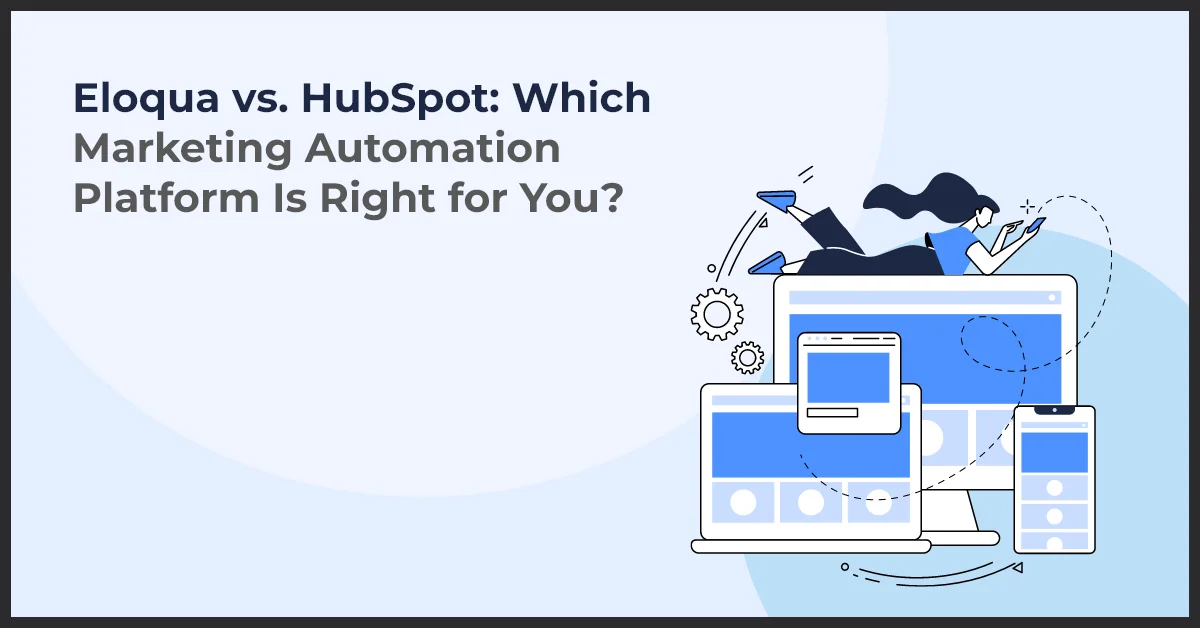Eloqua vs HubSpot: Finding the Best Marketing Automation Platform

Published on: December 4, 2024
Updated on: February 25, 2025
1379 Views
- Marketing Automation
9 min read
Are you exploring the right marketing automation platform for your business? In today’s ever-changing digital marketing environment, the importance of marketing automation tools cannot be overstated. These platforms have transitioned from optional tools to essential components for businesses aiming to scale effectively and efficiently. Among the many choices available, Eloqua vs. HubSpot stands out as two prominent names recognized for their robust features, each offering unique capabilities to nurture and engage customers throughout their journey.
In this analysis, we will examine Eloqua vs. HubSpot in greater detail, providing a comprehensive comparison beyond the basic functionalities. This discussion will highlight the key differences between the two platforms, equipping you with the insights needed to make a choice that aligns with your business goals and operational needs.
Whether you are a new startup or an established company, the insights presented here will illuminate your path to developing a more intuitive and results-driven marketing strategy.
Discovering Eloqua: A Powerhouse for Enterprise Marketing Automation
Eloqua emerges as a comprehensive marketing automation tool that propels enterprise-level businesses forward. With a suite designed to handle the complexities of large-scale operations, Eloqua provides users with sophisticated functionalities to fine-tune their marketing strategies.
Key Features
At the nucleus of Eloqua’s offering are advanced campaign management tools that allow for nuanced customization and execution of marketing campaigns. Detailed analytics deliver actionable insights for decision-makers seeking to understand campaign performance and customer behavior. Further empowering marketers is Eloqua's intelligent lead scoring system, which prioritizes leads based on their engagement levels and propensity to buy. The cherry on top is seamless CRM integration that ensures marketing efforts are aligned with sales processes, facilitating a unified approach to customer engagement.
Pros and Cons
- Pros: Eloqua's robust automation capabilities can transform marketing processes, enabling users to craft personalized journeys for prospects and customers. Its detailed reporting features provide depth and clarity, contributing to strategic planning and performance tracking. Scalability comes naturally with Eloqua, comfortably supporting marketing functions as a business expands.
- Cons: With such an array of advanced features, the platform comes with a steeper learning curve, potentially requiring more time for users to harness its full potential. The higher cost also reflects its enterprise targeting, which may place it beyond the reach of smaller businesses seeking budget-friendly solutions.
Pro Tip: Train your team on Eloqua’s features to fully leverage its advanced marketing automation capabilities. This will help streamline your marketing processes and improve campaign effectiveness.
Discover HubSpot: The All-in-One Marketing Suite
HubSpot is a comprehensive automation platform designed to meet businesses' marketing, sales, and customer service needs, particularly those of small to midsize size. Its architecture focuses on user experience, ensuring seamless navigation through various tools and services. Recognized for its powerful yet user-friendly character, HubSpot caters to a broad spectrum of business needs through an integrated approach.
Key Features of HubSpot
- HubSpot offers a complete marketing, sales, and customer service suite that enables businesses to manage their activities under one roof, fostering a unified strategy.
- The interface is intuitively crafted, allowing users to move fluidly between tasks without steep learning curves.
- Adaptability is a hallmark of HubSpot, which boasts a rich array of integrations that complement and extend its native capabilities.
Pros and Cons
Pros:
- The platform's simplicity makes it highly accessible, even for those new to marketing automation.
- Diverse pricing models render HubSpot an affordable option, accommodating various budgetary constraints.
- By combining multiple functionalities, HubSpot streamlines operations, eliminating the need for disparate solutions.
Cons:
- Businesses with complex requirements may find HubSpot's offerings insufficient, as it occasionally falls short in specialized advanced features.
- Some of HubSpot's more elaborate features necessitate investment in higher-tiered pricing plans, which may be a deterrent for some.
Pro Tip: Companies should evaluate their needs for HubSpot’s tiered services. Engaging in a trial or demo can reveal whether HubSpot’s environment matches a business's scale and complexity. This exploration also allows companies to determine if HubSpot will seamlessly integrate with their existing workflows and technical infrastructure.
Eloqua vs. HubSpot: Feature Comparison
Diving into the intricate details of Eloqua and HubSpot, discerning feature differences can illuminate the ideal choice for distinct business needs. Breaking down specifics like automation capabilities to analytics prowess offers a precise understanding of each platform's strengths.
Ease of Use
Evaluating Eloqua and HubSpot for user-friendliness, one observes the nuances in interface design and campaign setup processes. Users generally report HubSpot’s interface as more intuitive, allowing faster adoption for new users. With its robust feature set, Eloqua presents a steeper learning curve, which may extend the setup time for campaigns but caters to a more tech-savvy audience.
Marketing Automation
When examining automation, Eloqua presents itself with advanced workflows and comprehensive triggers that precisely mold the user experience. Its personalization options create tailored pathways for customer engagement. HubSpot also offers a powerful automation environment emphasizing ease of use and approachability for those with less technical expertise. Both platforms ensure marketing efforts pivot seamlessly with customer behavior.
Analytics and Reporting
Analytics tools underpin the effectiveness of marketing strategies. Eloqua offers deep analytics opportunities that satisfy data scientists and marketing analysts looking for extensive reports and insights. HubSpot’s analytics, while potentially less exhaustive than Eloqua's, present information more succinctly, benefiting organizations requiring straightforward reporting and actionable insights.
Integration and CRM Compatibility
Integrating with existing systems, Eloqua and HubSpot connect with many popular CRMs and third-party applications. Eloqua showcases highly customizable integration capabilities, favoring organizations with complex ecosystems. Conversely, HubSpot champions ease of integration, providing a seamless experience for users who prioritize straightforward connectivity and use HubSpot's CRM system.
Pricing
Cost evaluations of Eloqua and HubSpot reveal contrasting structures, reflecting their distinct market positioning. Eloqua, often carrying a heftier price tag, aligns with enterprise-level needs, offering extensive customization potential. HubSpot scales its pricing with a gradient approach, from smaller businesses seeking growth to larger enterprises, making its value proposition clear across the spectrum.
Let’s Understand in brief.
| Feature | Eloqua | HubSpot |
|---|---|---|
| Ease of Use | Complex setup | Intuitive interface |
| Marketing Automation | Advanced workflows | User-friendly automation |
| Analytics | Deep insights | Straightforward reporting |
| Integration | Highly customizable | Easy connectivity |
| Pricing | Higher cost | Scalable for all sizes |
Pro Tip: Companies should evaluate their needs for HubSpot’s tiered services. Engaging in a trial or demo can reveal whether HubSpot’s environment matches a business's scale and complexity. This exploration also allows companies to determine if HubSpot will seamlessly integrate with their existing workflows and technical infrastructure.
Eloqua vs. HubSpot: Which One is Right for You?
Deciding between Eloqua vs. HubSpot hinges on several factors, including your business size and specific marketing needs. With this knowledge, making an informed decision becomes a more direct process.
For Small Businesses
HubSpot shines as a beacon for small businesses or those just embarking on the marketing automation journey. The platform's user-friendly interface and features are tailored to streamline the marketing process and simplify the learning curve. HubSpot provides a comprehensive suite of tools within its CRM, allowing for efficient management of customer interactions, content creation, and performance tracking. This harmonious integration enables small businesses to achieve professional-grade marketing without extensive resources.
For Enterprises
Contrastingly, Eloqua emerges as a formidable contender for enterprises. The robust nature of Eloqua's marketing automation tools caters to large-scale operations demanding high levels of customization and intricate campaign logic. Eloqua's ability to scale and handle complex data segmentation and integrations with other enterprise systems makes it a valued asset for larger organizations. The platform's precision and efficacy in executing sophisticated marketing strategies are aligned with the demands of a sizable clientele base and a dynamic market presence.
- HubSpot's allure for small businesses lies in its all-in-one functionality, eliminating the need for multiple disjointed tools.
- Eloqua appeals to enterprises with its flexibility, granting them the power to orchestrate elaborate marketing automation workflows.
Reflect on your business's operational scale and the depth of marketing initiatives required to engage your audience effectively. This reflection will guide you toward the choice that aligns with your organization's vision and growth trajectory.
Key Takeaways
- Choosing Between Eloqua and HubSpot: When deciding on Eloqua vs HubSpot, consider that HubSpot is ideal for small to medium-sized businesses due to its user-friendly interface and scalable pricing, while Eloqua is better suited for large enterprises with complex marketing needs.
- Ease of Use: HubSpot offers a more intuitive interface, allowing for quick adoption, whereas Eloqua requires more time to master due to its advanced features.
- Marketing Automation Capabilities: Eloqua provides advanced workflows and detailed analytics, whereas HubSpot offers simpler yet powerful automation tools.
- Integration and CRM Compatibility: Eloqua supports highly customizable integrations for complex systems, while HubSpot focuses on easy connectivity with its built-in CRM.
- Pricing Strategy: HubSpot features a scalable pricing model with a free tier, making it accessible to businesses of all sizes. In contrast, Eloqua's pricing is higher, reflecting its enterprise-level capabilities.
Conclusion: Finding Your Best Fit
Both Eloqua and HubSpot are exceptional marketing automation platforms, each tailored to meet the distinct needs of different businesses. Eloqua is designed for larger enterprises with complex marketing requirements, offering advanced features supporting intricate customer journeys and data management. Its robust capabilities are ideal for organizations seeking to implement multi-channel marketing strategies and measure their performance in depth.
On the other hand, HubSpot is perfectly suited for small to medium-sized businesses that need an all-in-one, user-friendly solution. Its intuitive interface allows teams to streamline their marketing efforts without the steep learning curve often associated with more complex platforms. HubSpot provides essential tools for email marketing, social media management, content creation, and analytics, making it a comprehensive choice for growing businesses.
By thoroughly understanding your specific marketing needs and how these platforms align with them, you can make an informed decision that will enhance your marketing efforts and drive growth.
Ready to elevate your marketing strategy? Contact Growth Natives today to discuss how we can help you choose the right marketing automation platform tailored to your business needs. Whether you’re considering Eloqua for its sophisticated capabilities or HubSpot for its ease of use, our experts are here to guide you through every step.
What are you waiting for? Let’s unlock your business’s full potential together with Growth Natives today!
Frequently Asked Questions
HubSpot often emerges as the more budget-friendly option for small businesses. Its pricing structure includes a free tier, and scalable plans cater to growing companies. In contrast, Eloqua’s solutions are generally geared toward larger enterprises, and its pricing reflects the advanced capabilities preferred by such organizations.
While using Eloqua and HubSpot in tandem is technically possible, doing so requires high integration proficiency. Seamless operation between the two could maximize their strengths; however, the complexity and cost of running two sophisticated platforms concurrently might not justify the undertaking for most businesses.
Transitioning from Eloqua to HubSpot or vice versa involves a significant investment in time and resources. Data migration, system reconfiguration, and user training present challenges. The migration complexity is influenced by the scale of existing data and the intricacy of marketing workflows in the original system.
HubSpot is renowned for serving the small business sector with its comprehensive, user-friendly platform, extensive training resources, and community support. These features combine to make HubSpot a compelling choice for small businesses seeking robust marketing automation with a gentle learning curve.



